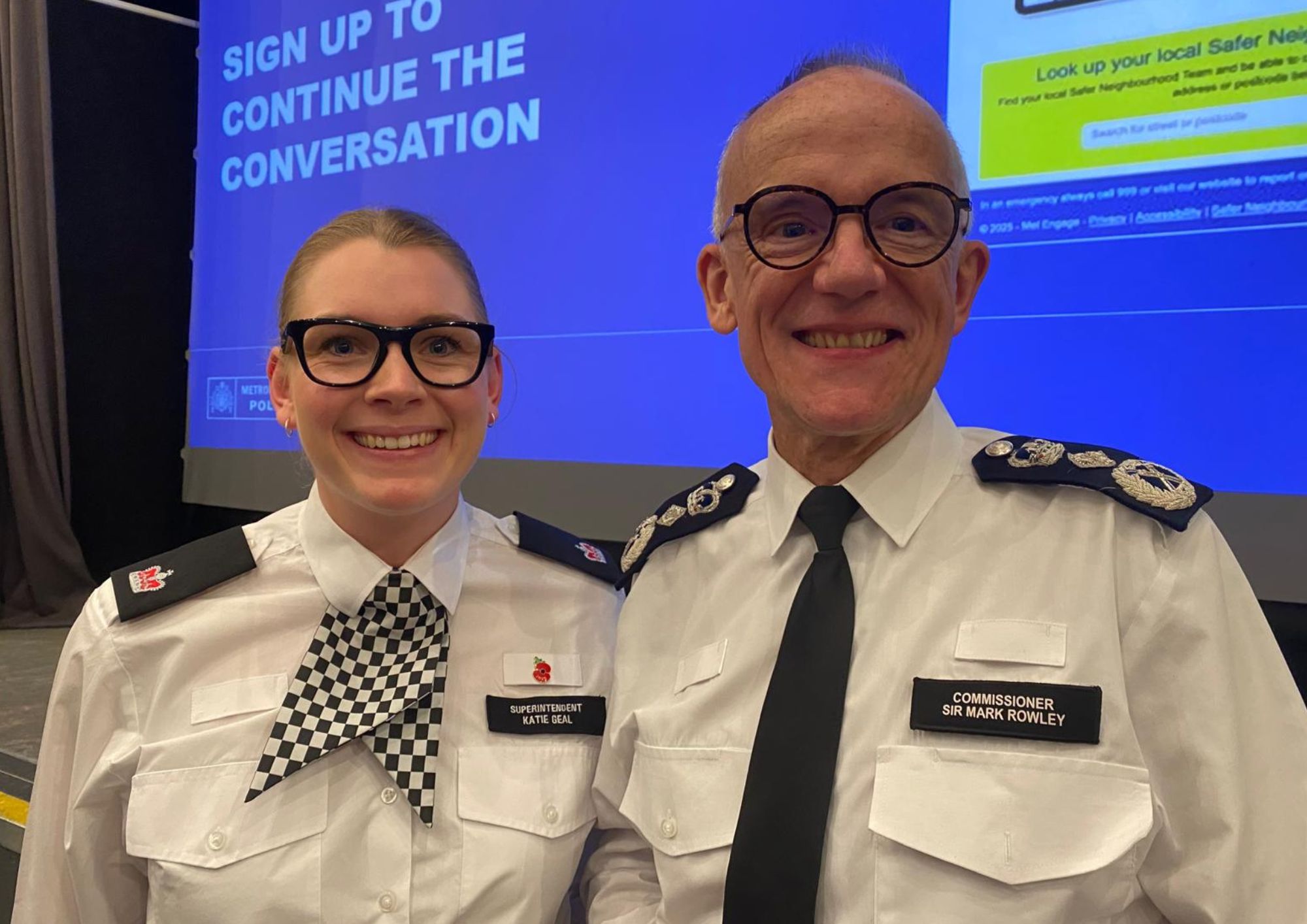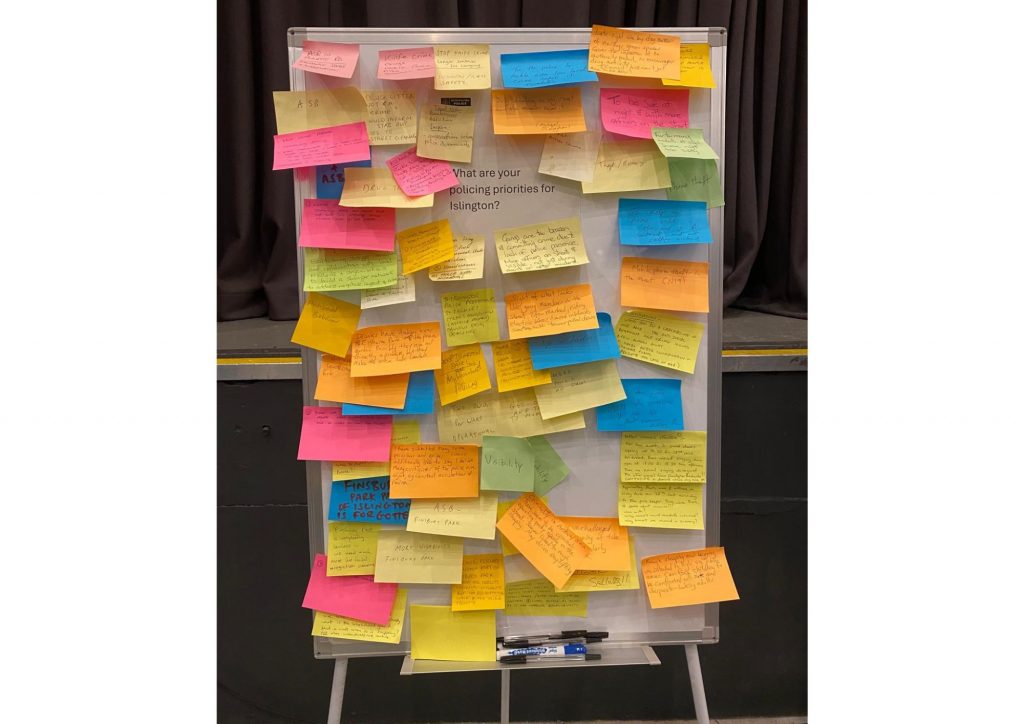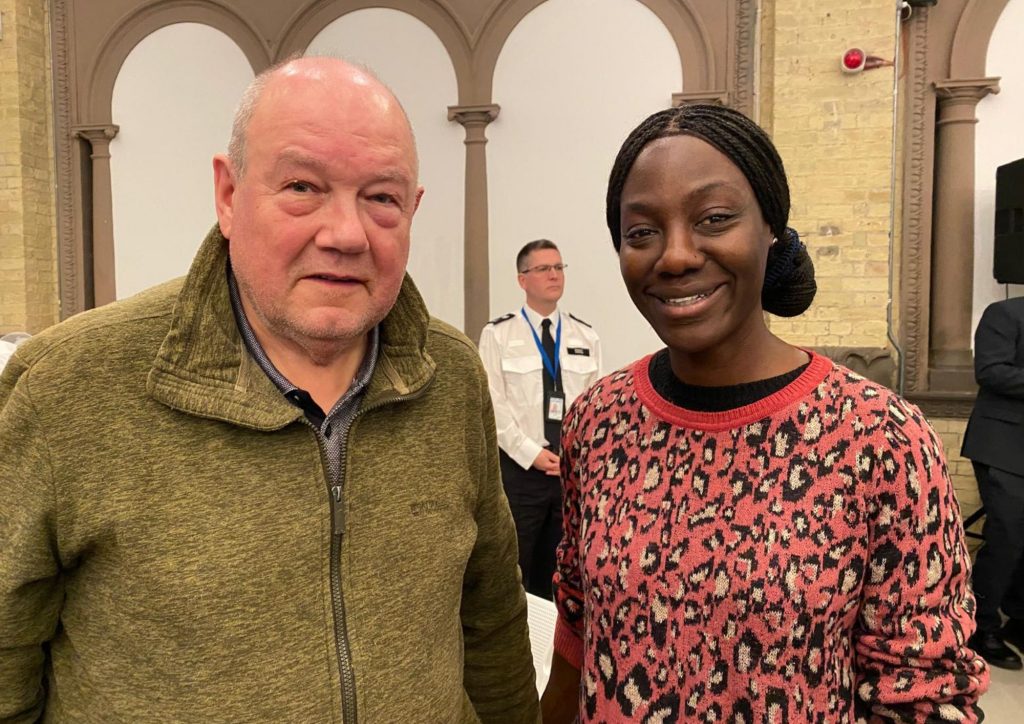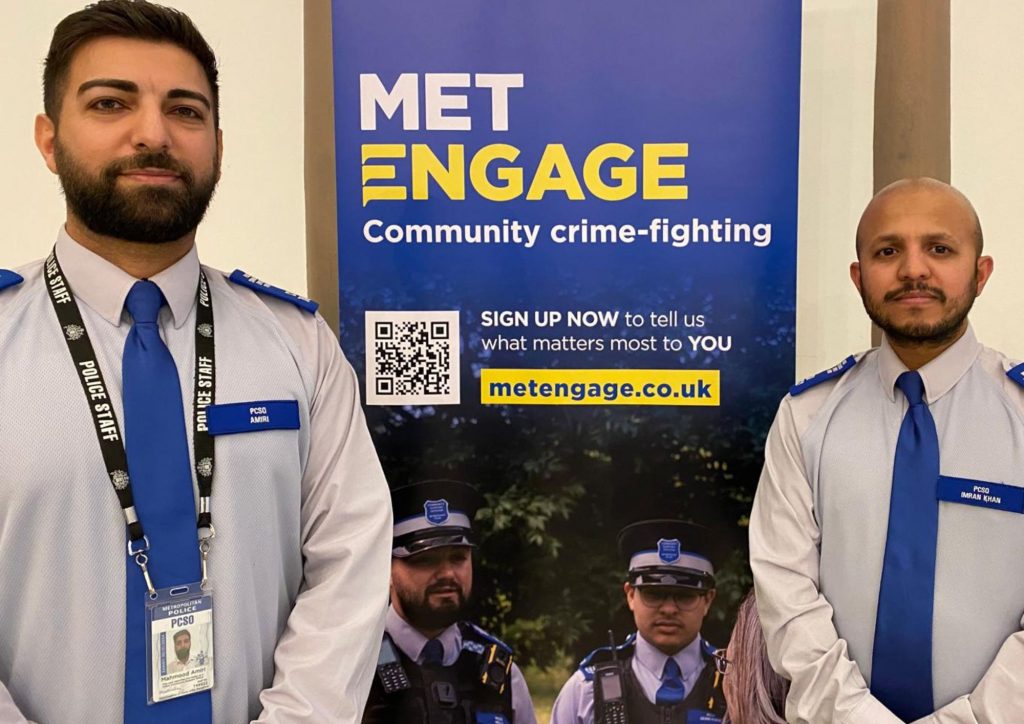Police statistics show fall in crime but residents tell Met chief: ‘We don't feel safe'
Met’s top brass say offences are down – but residents at packed meeting tell a different story
Monday, 17th November 2025 — By Daisy Clague

Islington superintendent Kate Geal with Met commissioner Sir Mark Rowley
THE MET’S top brass joined Islington Police at a packed out meeting in Holloway this week where they told how crime rates are down and there are more officers on the streets than ever – but some residents told the Tribune they still don’t feel safe.
Nearly 200 people were at London Metropolitan University on Tuesday evening to hear from Met Commissioner Sir Mark Rowley and Islington’s police chiefs about the force’s work over the past two years and to feed back their own perceptions of policing in the borough.
Islington officers told of a reduction in violent offences, 16 additional officers on the beat in Finsbury Park, a 10 per cent reduction in anti-social behaviour reports, officers engaging with young people on their ways to and from school, and special projects targeting violence against women and girls, e-bike crime and shoplifting.
But residents told another story – of relentless ASB, women feeling too vulnerable to walk the streets and confusion over how best to report crime.
Tony Brockman has lived in Finsbury Park for 40 years, but told the Tribune that crime has become so bad he’s considering moving out of the area.
“The public don’t feel safe. I know there is a lot they can do with technology, but what’s needed are boots on the ground,” he said.
Mr Brockman told how he has experience five criminal incidents in just two years, including being physically assaulted by someone on an electric bike in Seven Sisters Road and people using his front garden as a toilet.
“I think there’s massive under-reporting,” he added.
“People have given up, because what’s the point if you don’t get anything back? Some of the channels [for reporting] are very confusing, and it’s not always clear whether you should go to the council or the police.”

Residents use post-it notes to share what they think policing priorities should be
Tollington resident Jonathan Ward similarly told the meeting that communication was a problem.
“There’s a lot of great work you’re doing, but people aren’t accessing it,” he said, explaining that officers had previously told him and his neighbours to report ASB via email, but that those email addresses no longer work.
“How can people have trust if you’re not going to create clear channels to report into you?” he said.
And while Tuesday’s event was, in part, to promote the Met’s new crime reporting portal, Met Engage, Mr Ward added: “When I go to Met Engage now, I get signed up to neighbourhood watch, which wants to sell me burglar alarms. I’m not actually getting put in touch with you.”
Officers explained there had been an email migration, which may have meant some reports were not received.

Councillors Gary Heather and Valerie Bossman-Quarshie
Regarding Met Engage, Borough Commander Jason Stewart said: “Please bear with us on that, it is a fairly new system.”
He added: “This isn’t just a one-off event.
“My teams will be going home tonight reflecting on these conversations. My teams are connected to the communities – when you feel something, we feel something. We really do get it, we really feel it, and we are here with you. Everything you’re talking about tonight we stand ready to deliver on that and keep moving forward.”
Tufnell Park resident Kemi Leddy told the Tribune she was particularly concerned about women’s safety.
She said: “It’s all interconnected – when you don’t have drug and alcohol services you have people who are using and they are going to turn to crime to fund their habit. So that will have massive impact on the people they share the space with. I don’t want drug dealers on my street, but harassing the police to move them to my neighbour’s street isn’t the answer. It needs to be a joined-up approach.”
Despite the reported decline in anti-social behaviour, when Islington Superintendent Katie Geal asked how many people had been affected by ASB, at least half of attendees put up their hands.
She said: “I can clearly see that that problem is not solved, and I recognise this has a real impact on people’s lives. Anti-social behaviour is often the thing that grinds down that quality of life, so I really do acknowledge that it is clearly still a really big problem for the borough, and we’re committed to still trying to work on that.”
She also addressed a recent spate of stabbings across the borough.
Ms Geal said: “We’ve seen a reduction in serious violent offences, but we do know that recent incidents of serious violence across Islington will have caused some real concern among the community and we’re looking to address that. We’ve been doing a lot of work with the local authority around increasing patrols, so we’re not trying to solve these problems alone.”

Finsbury Park community officers Mahmood Amiri and Imran Khan
Met Commissioner Sir Mark Rowley told that despite cuts to Met budgets, its neighbourhood policing teams and work on violence against women and girls are growing.
“You are less likely to be injured from assault on the streets of London than you are in Birmingham or Manchester or Leeds. London is a safe city,” he said.
“A chunk of what Katie and her team are worried about is what you’re telling them is most important. So we’re sharing the power between my end of the telescope in Scotland Yard, and your end of the telescope here.”
Sir Mark also told the meeting about wider changes within the Met over the past two years, following the 2023 Casey Report that found institutional racism, sexism and homophobia within the organisation.
He told the Tribune: “Someone in my position gets lots of information through paperwork and second-hand, so it’s important for me to get out and check on where we are – whether it’s speaking to my frontline officers or events like this where I hear from the community.”